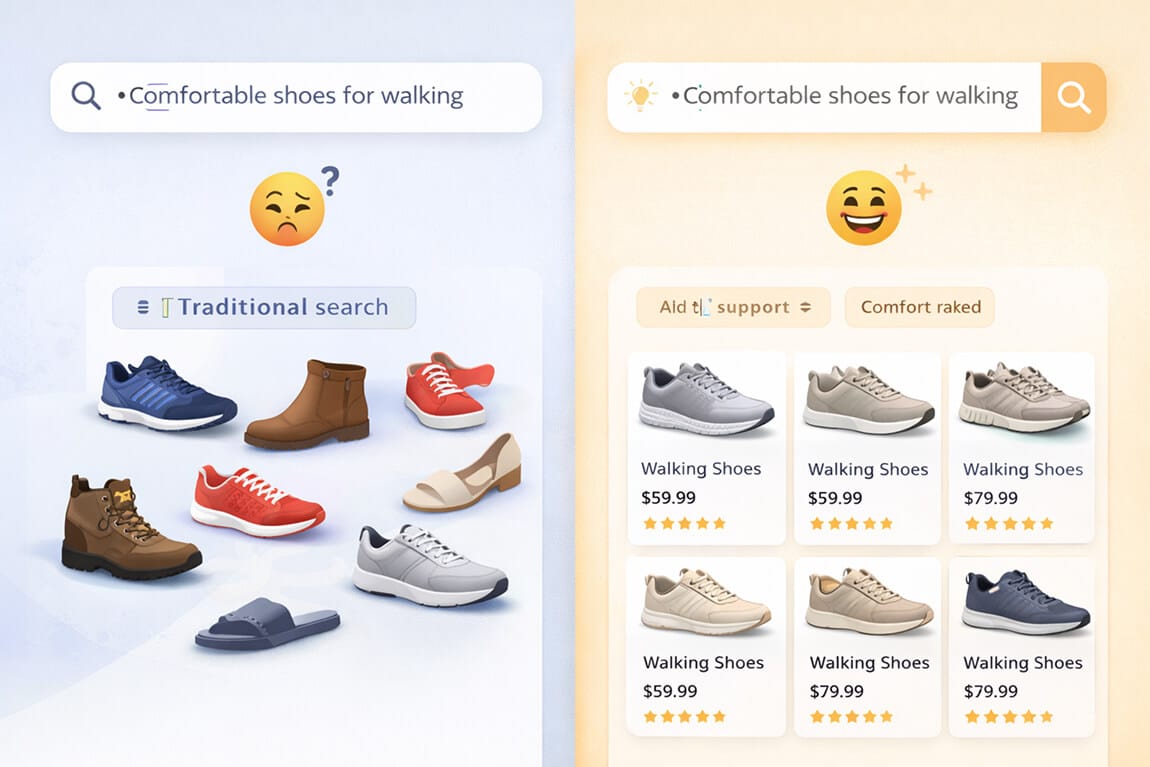
Big data has been rapidly transforming the eCommerce industry. It has a significant impact on how businesses operate and interact with their customers. Its ability to offer valuable customer insights, such as customer information, preferences, pain points, sales figures, and so on facilitates seamless yet thoughtful decision-making.
Big data empowers eCommerce businesses to gain a competitive edge in this rapidly changing eCommerce and retail market. No wonder the big data market is expected to reach $103 billion by the end of this year.
In simple words, big data refers to the large volume of data that is generated from various sources, stored, processed, and analyzed to uncover valuable insights for eCommerce businesses. It offers excellent customer insights for demand forecasting, targeted marketing, supply chain optimization, and overall effective decision-making.
In this post, we will learn more about how big data is shaping the dynamics of the competitive eCommerce industry.
The Impact of Big Data on Customer Behavior Analysis
Big data has an extraordinary impact on customer behavior analysis. It empowers eCommerce businesses like yours to gain deeper insights into their customer's preferences, pain points, buying habits, and behavioral patterns. This data enables you to build highly personalized experiences for customers while addressing their unique needs and interests.
Let us quickly understand how big data revolutionizes customer behavior analysis to grow your business.
1. Tracking and Analyzing Customer Interactions
Big Data in eCommerce helps in capturing large amounts of customer data across various touchpoints. Whether it is your eCommerce website, mobile apps, or social media, the advanced algorithms supporting big data initiatives record valuable insights into customer behavior, demographics, preferences, and pain points. Further, these sophisticated analytics modules are empowered to uncover intelligent data patterns and identify trends to personalize shopping experiences for customers. Thus, big data helps you build more targeted marketing strategies that focus on streamlining the buying process, simplifying customer interactions, and improving customer satisfaction.
2. Personalization and Customization in ECommerce
As advanced analytics and machine learning algorithms analyze huge volumes of customer data and process diverse datasets, they gain insights into the customer's preferences, interests, behaviors, and more across multiple touchpoints. This comprehensive data enables you to create a 360-degree view of your customers that comes in handy for offering highly-personalized product recommendations.
Big data supports your targeted marketing campaigns by allowing you to segment your customers into different groups, such as loyal customers, frequent buyers, price-sensitive customers, and more, and provide them with personalized offers and discounts. This helps you build stronger relationships with your customers leading to higher engagement, improved conversions, and increased sales.
3. Improving Customer Experience and Satisfaction
Big data consolidates customer's data from various touch points enabling you to offer personalized services to each of them. It helps you understand their needs, address their concerns proactively, and interact with them seamlessly across all channels. You can offer them tailored product recommendations, offers, discounts, limited-time deals, and more to build more engaging shopping experiences.
You can also leverage these data-driven customer insights to refine your product offerings and align them more with your ideal customer's preferences. This helps you build a product that addresses your customer's pain points and streamlines their overall experience with your brand leading to increased satisfaction and loyalty.
Utilizing Big Data for Inventory and Supply Chain Management
Besides improving customer experiences, big data helps you manage your inventory and supply chain operations through informed decision-making. Let us have a look at the top three areas where big data has proved to be a savior.
1. Predictive Analytics for Demand Forecasting
As we know, big data helps you gather and analyze different types of customer data, such as customer demographic information, historical sales data, customer behavior, market trends, and so on. This information is good enough to make accurate demand forecasts. Predictive analytics solutions are equipped to identify the patterns and correlations in this data to anticipate the demand for your products. Thus, reducing the chances of stockouts or excess inventory and helping you manage your finances, and keeping your customers happy.
2. Enhancing Inventory Optimization
With demand forecasting and continuously monitoring sales data in real time, you can determine the ideal stock levels for your products across all locations. Big data can help you implement smart inventory management strategies which ensures that the products are available as and when they are needed. Further, it will also help you identify obsolete products or slow-moving items thereby enabling you to optimize your inventory and avoid overstocking.
3. Streamlining Supply Chain Operations
Big data offers you end-to-end visibility in your supply chain operations by giving you real-time insights into every stage of the process. From managing the manufacturers and suppliers to coordinating with logistics and transportation, big data helps you identify the bottlenecks and inefficiencies that could potentially lead to delays in shipments. It helps you identify high-performing and reliable suppliers, manufacturers, distribution centers, logistics providers, and more to enhance the overall supply chain efficiency.
Leveraging Big Data for Pricing and Revenue Optimization
Considering how competitive the eCommerce industry landscape is becoming, it is wise to optimize the pricing of your products while maximizing revenue. Due to its innate ability to analyze complex customer information and market data, big data has proven to be useful in pricing and revenue optimization.
Some of the ways how big data helps in making informed pricing decisions are as follows.
- Dynamic pricing strategies - Adjust your product pricing in real-time based on its demand, competitor pricing, inventory levels, customer behavior, and more. Rely on big data algorithms to identify market trends and historical data to set optimal prices for your products in a way that satisfies the supply-demand dynamics.
- Competitive pricing analysis - Conduct a comprehensive competitive pricing analysis by collecting and analyzing product data and pricing from your competitor's websites and marketplaces with the help of big data analysis. These insights will help you identify the pricing gaps in your market and formulate effective pricing strategies that will not only attract customers but also maximize profits.
- Maximizing profit margins with data insights - Understand which products your customers are willing to pay a premium for and increase their pricing strategically to maximize profitability. Focus on promoting those items across various platforms to elevate the profit margins. You can also leverage promotions and discounts, such as holiday offers, product bundling, subscription-based models, and more to build tailored campaigns without disrupting the profit margins.
Enhancing Marketing and Advertising Strategies with Big Data
Big data empowers you to deliver a more targeted and personalized experience to your customers via effective advertising and marketing campaigns. It provides insights into the complete customer journey right from the first touchpoint to conversion and more. This helps you build foolproof marketing campaigns that promise higher engagement and better conversions.
1. Targeted Marketing Campaigns
Create highly targeted marketing campaigns by grouping your customers into different segments based on various attributes like demographics, purchase behavior, purchase history, browsing history, interests, and more. Remember including personalized content in your marketing campaigns helps customers to resonate with your brand better thereby leading to increased engagement and higher conversion rates. Leverage predictive analytics to anticipate customer's needs and use it to deliver targeted messages at the right time and on the right platform.
2. Behavioral and Contextual Advertising
As you analyze customer behavior across multiple channels, such as websites, mobile apps, social media, and more, you can deliver contextual advertisements to customers based on their interests and real-time activities on the said channels. For example, a customer who is checking out a certain product for a long time can be targeted with relevant ads on social media to encourage them to complete their orders.
3. A/B Testing and Conversion Rate Optimization
Try experimenting with different marketing strategies to optimize your conversion rates. Create different website layouts, ad creatives, and so on to identify which variations perform better and refine your marketing campaigns accordingly.
Big Data Analytics for Fraud Detection and Risk Management
Big data analytics plays a crucial role in identifying and preventing fraudulent activities, analyzing patterns and anomalies in transactions, and mitigating security risks and data breaches. It helps you address risks proactively and safeguard your company operations. Let us understand how big data analytics helps in fraud detection and risk management in three effective ways.
- Identifying and Preventing Fraudulent Activities
Big data helps you identify and stop fraud in real time by monitoring customer interactions, transactions, and other account-related activities. The advanced machine learning algorithms that big data employs can detect suspicious activities, patterns, and behaviors, such as account takeovers, suspicious payment transactions, unauthorized access, and more to prevent financial losses and protect customer information. - Analyzing Patterns and Anomalies in Transactions
As big data analytics processes vast data sets at a time to uncover anomalies, it can flag those transactions that are significantly different from the usual ones. This helps you identify the potential risks early on and take action proactively. This helps you take immediate action, reducing the impact of fraudulent activities and ensuring timely fraud prevention. - Mitigating Security Risks and Data Breaches Big data helps you identify potential security risks and vulnerabilities, such as unusual access attempts, malware activity, unauthorized data access, and more by analyzing security logs, network traffic, user behavior, and more. It helps you conduct regular security audits and penetration testing to prevent data breaches or cyberattacks and proactively identify and address weaknesses in your security infrastructure.
The Role of Big Data in Improving Operational Efficiency
Big data plays a crucial role in improving the operational efficiency of your business in the following ways.
- Streamlining operations and processes
By harnessing vast amounts of data and applying advanced analytics, you can streamline operations, optimize logistics, and reduce costs, leading to enhanced productivity. Big data enables you to identify bottlenecks and inefficiencies in processes thereby making room for targeted improvements and streamlining of operations. - Optimizing logistics and delivery
Big data helps optimize routes, predict demand, and manage inventory efficiently by analyzing traffic conditions, weather, delivery routes, and more in real time. It offers outstanding insights to reduce delivery times, minimize transportation costs, and enhance overall logistics operations thereby enabling you to make informed decisions and optimize the delivery process. - Reducing costs and enhancing productivity
It can identify cost-saving opportunities, such as optimizing energy usage or supply chain management. You can also achieve higher productivity by strategically allocating resources and investing in modern tech tools.
Big Data and Predictive Analytics for Trend Forecasting
Besides demand forecasting, big data and predictive analytics are proven to be useful for trend forecasting. You can gain valuable insights into the emerging market trends and anticipate consumer demands thereby staying ahead of your competitors. Let us now understand how big data and predictive analytics facilitate trend forecasting.
- Identifying emerging market trends - As big data analyze vast amounts of data from various sources, such as social media, online forums, product reviews, and industry reports, you can identify early indicators of emerging market trends. It can detect patterns and correlations in the data, helping you recognize new preferences or customer behaviors that are gaining popularity.
- Anticipating consumer demands - By observing consumer behavior, preferences, and purchase history, you can anticipate future demands for your products. This will help you monitor your product inventory better and proactively meet your customer's needs. It will also offer you amazing chances at modifying your marketing strategies.
- Staying ahead of competitors - By identifying trends early on, you can innovate and launch new products or services to meet upcoming demands before your competitors. This proactive approach will position your brand as an industry leader, thereby helping you capture market share and boost customer loyalty.
Harnessing Big Data for Customer Relationship Management (CRM)
Big data also plays a significant role in enhancing customer relationship management by offering you intelligent insights about customer behavior, purchase history, sales figures, customer preferences, and so on. This helps you deliver the best shopping experiences and improve customer retention.
Building Customer Profiles and Segmentation
By collecting and analyzing vast customer information, you can create detailed customer profiles and group them into various categories. These categories can be formed based on the customer's preferences, needs, pain points, and so on. This helps you build data-driven marketing strategies that can be targeted toward a certain segment of customers.
Customer Lifetime Value Analysis
You can conduct a customer lifetime value analysis to predict the future value of every customer as long as they maintain a strong relationship with your business. This will help you identify customers with long-term revenue potential allowing you to craft incredible strategies for customer retention.
Improving Retention and Loyalty Programs
Besides providing intelligent customer information, big data helps in identifying factors that are influencing customer churn. You can address this by devising personalized retention strategies, such as tailored offers, rewards programs, loyalty programs, exclusive memberships, and more to foster customer loyalty and reduce customer churn.
The Ethical and Privacy Concerns of Big Data in ECommerce
Data security, transparency, and privacy regulations are becoming the topic of discussion since the introduction of big data in eCommerce. Let us explore how you can address these concerns associated with leveraging big data.
- Data security and privacy regulations - With big data storing and processing large volumes of data, the risk of data breaches is growing manifold. You must prioritize data security by implementing various encryption techniques and access control mechanisms to protect customer information. You must also conduct regular audits to prevent unauthorized access and ensure that your customer data is handled responsibly.
- Transparency and consent in data collection - Be clear about how customer data is collected, for what purpose it is used, or with whom it is shared. Ensure that you comply with various data protection regulations such as the GDPR, CCPA, and others. Do not forget to obtain consent from customers before collecting their personal information.
- Balancing personalization with privacy - Lastly, maintain a balance between delivering targeted offerings and invading customer's privacy. No customer would be okay with excessive tracking. Hence, it is wise to offer them more control over their information and when they would like to hear from you.
Summary: The Future of Big Data in ECommerce
The future of big data in eCommerce is promising. It helps you to stay competitive, optimize operations, and deliver exceptional customer experiences in this competitive eCommerce industry. Harness the power of big data to capture intelligent data-driven insights today and lead your eCommerce business on the path to success.
Frequently Asked Questions (FAQs)
- What is big data in eCommerce?
With big data storing and processing large volumes of data, the risk of data breaches is growing manifold. You must prioritize data security by implementing various encryption techniques and access control mechanisms to protect customer information. You must also conduct regular audits to prevent unauthorized access and ensure that your customer data is handled responsibly. - How does big data benefit eCommerce businesses?
Be clear about how customer data is collected, for what purpose it is used, or with whom it is shared. Ensure that you comply with various data protection regulations such as the GDPR, CCPA, and others. Do not forget to obtain consent from customers before collecting their personal information. - What are the challenges associated with big data in eCommerce?
Lastly, maintain a balance between delivering targeted offerings and invading customer's privacy. No customer would be okay with excessive tracking. Hence, it is wise to offer them more control over their information and when they would like to hear from you. - What tools and technologies are used for big data analytics in eCommerce?
Be clear about how customer data is collected, for what purpose it is used, or with whom it is shared. Ensure that you comply with various data protection regulations such as the GDPR, CCPA, and others. Do not forget to obtain consent from customers before collecting their personal information. - How can eCommerce companies ensure data privacy and security?
Lastly, maintain a balance between delivering targeted offerings and invading customer's privacy. No customer would be okay with excessive tracking. Hence, it is wise to offer them more control over their information and when they would like to hear from you.










